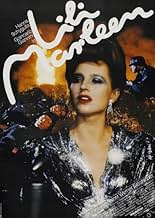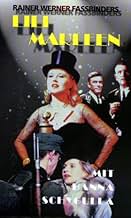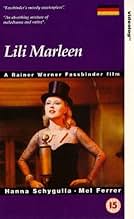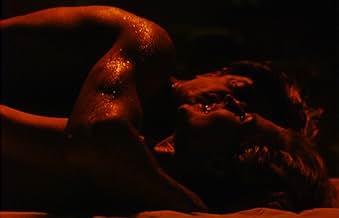IMDb RATING
7.1/10
4.6K
YOUR RATING
In 1938, a German singer falls in love with a Jewish composer in Zurich, who helps Jews flee Nazi Germany. She wants to help but is forced back to Germany. Her song "Lili Marleen" becomes a ... Read allIn 1938, a German singer falls in love with a Jewish composer in Zurich, who helps Jews flee Nazi Germany. She wants to help but is forced back to Germany. Her song "Lili Marleen" becomes a hit with soldiers and the Nazi top brass.In 1938, a German singer falls in love with a Jewish composer in Zurich, who helps Jews flee Nazi Germany. She wants to help but is forced back to Germany. Her song "Lili Marleen" becomes a hit with soldiers and the Nazi top brass.
- Awards
- 1 win & 4 nominations total
Karl-Heinz von Hassel
- Henkel
- (as Karl Heinz von Hassel)
Raúl Gimenez
- Blonsky
- (as Raul Giminez)
Featured reviews
I am terribly sorry, I know that Faßbinder still is called one of the greatest directors in post-war Germany and that most of his films are considered "master-pieces", but when I see "Lili Marleen" today, in 2004, I wonder what everyone is up and away about this movie! The acting is simply terrible - Hanna Schygulla is all the smiling like an idiot! -, the changings between Nazi-glamour and battlefields are ridiculous, the whole film looks as if it was made within two days in an attic. Probably it was exactly that way and many people seem to take this for "real art", but for me this movie is simply bad & cheap. Compare this to Viscontis "La Caduta degli Dei" and tell me again that "Lili Marleen" is a good movie...
It is based on the song Lili Marleen, sung by Lale Andersen, and her romance with Rolf Liebermann in the movie Willie and Robert. The film tried to be very impartial in relation to Lale and Nazism, although she helped discreetly, and for Robert, the Allies, however in the end, she ended up surrendering to Nazism, to continue singing, to leave the Black List, had to change her famous song with a military air, she didn't marry Rolf, but kept an eternal friendship, could have done better...
10hasosch
Many critics have felt offended that R.W. Fassbinder has portrayed both protagonist Wilkie and the Nazis in this movie in a human-like manner. Connoisseurs of other Fassbinder films, however, will realize that "Lili Marleen" (1981) belongs to Fassbinder's "women movies" like "The Marriage of Maria Braun" (1979) and "Lola" (1981). Fassbinder was convinced that "stories can be told much better with women than with men", because, according to Fassbinder, while men usually fulfill their determined roles in society, "women are capable of thinking in a dialectic manner". Dialectics, however, means that there is not only a thesis and its antithesis like usually in our black-and-white world, but a synthesis where the oppositions coincide. Moreover, dialectic means that because of the third instance of synthesis the absolute opposition of the difference between thesis and antithesis is abolished. Concretely speaking: Starting from a dialect point of view and portraying the fascist state, the underground fighters must necessarily use the basic means like the rulers do, and between offenders and victims there is thus a chiastic relation, so that every offender is also victim and every victim is also offender. Fassbinder has illustrated this abstract scheme, that transcends classical logic, in his play "The City, the Garbage and the Death" (1975) which was filmed by Daniel Schmid under the title "Shadow of Angels" (1976).
Therefore, approaching an a priori controversial topic like Nazi Germany, in a dialectic manner, the depiction of this time in the form of a movie gets even more controversial, especially for people who cannot or do not want to see that our recognition of the world is by far not exhausted with a primitive light-switch schema, but needs the third instance of synthesis as controlling instance of its opposite members thesis and antithesis. The mutual relationship between offenders and victims has to scrutinized, since it is simply not true that the offenders are the bad ones and the victims the good ones. In a synthetic viewpoint, the bad ones participate on the goodness as the good ones participate on the badness. They are mutually related. In a world-view based on classical logic, a relation between good and bad cannot even been established, and in an ethics based on this insufficient system of logic, the bad conscience of the survivors of Nazi Germany, feeling (illogically enough) responsible for the deeds of their ancestors, exclude the possibility of a relationship between the two extremes and thus a synthesis in the form a new evaluation based on this relationship as well. From Fassbinder's dialectic viewpoint, it follows that neither Lili Marleen nor Lola nor Maria Braun can be condemned for their "misuse" of the ruling system for their private purposes, because they don't misuse them, they just use them. In the opposite, since victims must repeat the actions of the offenders as the offenders must repeat the actions of the victims, because "good" and "bad" are no longer simple mirror images of one another like in two-valued logic, their strategies are legitimated by the chiastic structure of a logic that describes our world, that is not black and white at all, much better than a black-and-white logic.
Therefore, approaching an a priori controversial topic like Nazi Germany, in a dialectic manner, the depiction of this time in the form of a movie gets even more controversial, especially for people who cannot or do not want to see that our recognition of the world is by far not exhausted with a primitive light-switch schema, but needs the third instance of synthesis as controlling instance of its opposite members thesis and antithesis. The mutual relationship between offenders and victims has to scrutinized, since it is simply not true that the offenders are the bad ones and the victims the good ones. In a synthetic viewpoint, the bad ones participate on the goodness as the good ones participate on the badness. They are mutually related. In a world-view based on classical logic, a relation between good and bad cannot even been established, and in an ethics based on this insufficient system of logic, the bad conscience of the survivors of Nazi Germany, feeling (illogically enough) responsible for the deeds of their ancestors, exclude the possibility of a relationship between the two extremes and thus a synthesis in the form a new evaluation based on this relationship as well. From Fassbinder's dialectic viewpoint, it follows that neither Lili Marleen nor Lola nor Maria Braun can be condemned for their "misuse" of the ruling system for their private purposes, because they don't misuse them, they just use them. In the opposite, since victims must repeat the actions of the offenders as the offenders must repeat the actions of the victims, because "good" and "bad" are no longer simple mirror images of one another like in two-valued logic, their strategies are legitimated by the chiastic structure of a logic that describes our world, that is not black and white at all, much better than a black-and-white logic.
Yes, there is such a thing, despite the fact that IMDb does not currently list it.
This film is a clever examination of how hard it was NOT to become part of the Nazi system. Willie is a German singer, in love with a Swiss Jewish conductor. She returns to Germany to help her lover with the resistance, however his father - who disapproves of their relationship - has arranged that she will not be able to return to Switzerland. Stranded in Berlin, Willie is forced to use a Nazi connection just to get some work...and he just happens to be the newly appointed Cultural Director. So Willie is given the opportunity to perform and record 'Lili Marleen'. The song becomes a hit, and Hitler becomes a fan. I won't go into the rest of the plot, but be assured that there are twists and turns.
By the end of this movie, you will not be able to get the song 'Lili Marleen' out of your head as it is repeated countless times. Believe me, I saw the film last week, and I am still singing it.
This film is a clever examination of how hard it was NOT to become part of the Nazi system. Willie is a German singer, in love with a Swiss Jewish conductor. She returns to Germany to help her lover with the resistance, however his father - who disapproves of their relationship - has arranged that she will not be able to return to Switzerland. Stranded in Berlin, Willie is forced to use a Nazi connection just to get some work...and he just happens to be the newly appointed Cultural Director. So Willie is given the opportunity to perform and record 'Lili Marleen'. The song becomes a hit, and Hitler becomes a fan. I won't go into the rest of the plot, but be assured that there are twists and turns.
By the end of this movie, you will not be able to get the song 'Lili Marleen' out of your head as it is repeated countless times. Believe me, I saw the film last week, and I am still singing it.
Jolly good show eld chap - bit of a must see if you like that eld song... I don't know what the makers of this film were thinking, but it was obviously something along the lines of "Dash it all! We appear to got ourselves into a spot of bother here! Too many of the chaps and gels have accents which aren't quite up to par! Well, not to fear - technology to the rescue! I'll just call up the chaps at the club and get them to lend their distinguished Queens English voices to making this film a ripping english yarn about a German singer and a Swiss Jewish music artist..."
Well, the dubbing of an obviously English film with 'upper crust' English accents had me rolling in the aisles, snorting with laughter at some points throughout the film - it all rather distracted from what was really a very good film. Although the editing was a bit choppy in places (1970's relict directing?), the film faily trundles along providing a genteel look at the distractions and hardships WWII had on life in Europe. True, towards the end, one can sympathise with Giancarlo Giannini's 'torture' scene where the Germans lock him up in a room to listen to a couple of lines from the song, 'Lili Marleen' over and over again... How much was Giannini acting and how much was genuine suffering??? But, if you can overlook the dreadful dubbing, this is a good film!
Well, the dubbing of an obviously English film with 'upper crust' English accents had me rolling in the aisles, snorting with laughter at some points throughout the film - it all rather distracted from what was really a very good film. Although the editing was a bit choppy in places (1970's relict directing?), the film faily trundles along providing a genteel look at the distractions and hardships WWII had on life in Europe. True, towards the end, one can sympathise with Giancarlo Giannini's 'torture' scene where the Germans lock him up in a room to listen to a couple of lines from the song, 'Lili Marleen' over and over again... How much was Giannini acting and how much was genuine suffering??? But, if you can overlook the dreadful dubbing, this is a good film!
Did you know
- TriviaShot in English for American distribution; later dubbed in German
- GoofsKaufmann, the German officer who arrests Robert on the train, wears the uniform of an SS-Gruppenfuhrer (General) - it is highly unlikely that an SS General of such rank would be checking identity papers at random on a train.
- SoundtracksLili Marleen
(German Version)
(based on a poem from the 1915 book "Die kleine Hafenorgel" by Hans Leip)
Music By Norbert Schultze,
Vocals Hanna Schygulla
(p) 1981 Schlicht Musikverlag, Phonogram, GmbH, DRG Records, Inc., Philips
© Metropolis Records
Published By Brampton Music Ltd., Chappell Music Ltd., Peter Maurice Music,
EMI Music
- How long is Lili Marleen?Powered by Alexa
Details
Box office
- Budget
- DEM 10,500,000 (estimated)
- Gross US & Canada
- $8,144
- Opening weekend US & Canada
- $11,623
- Feb 16, 2003
- Gross worldwide
- $8,158
Contribute to this page
Suggest an edit or add missing content






















